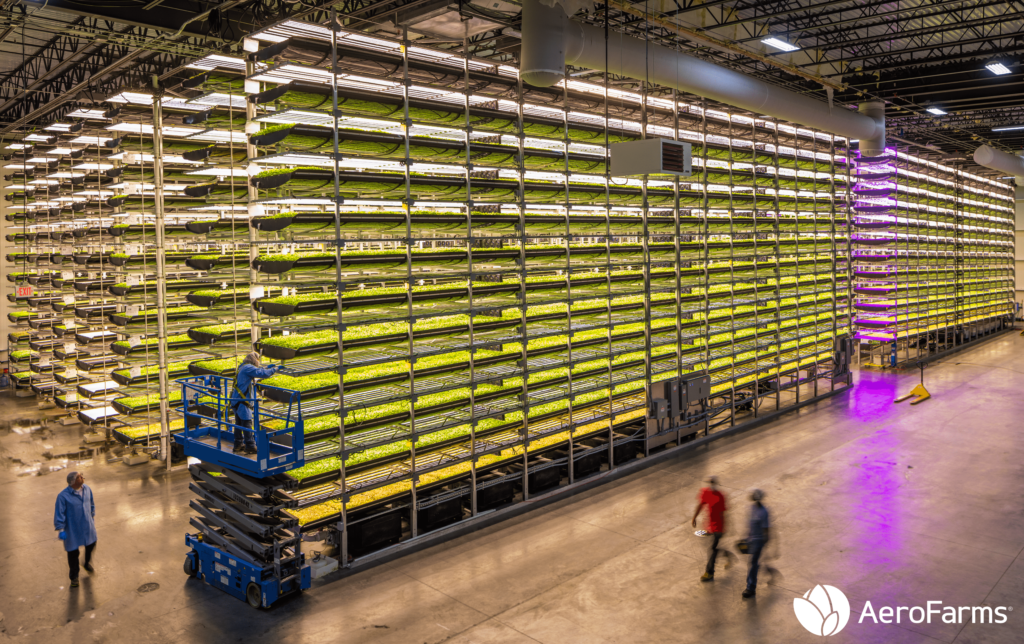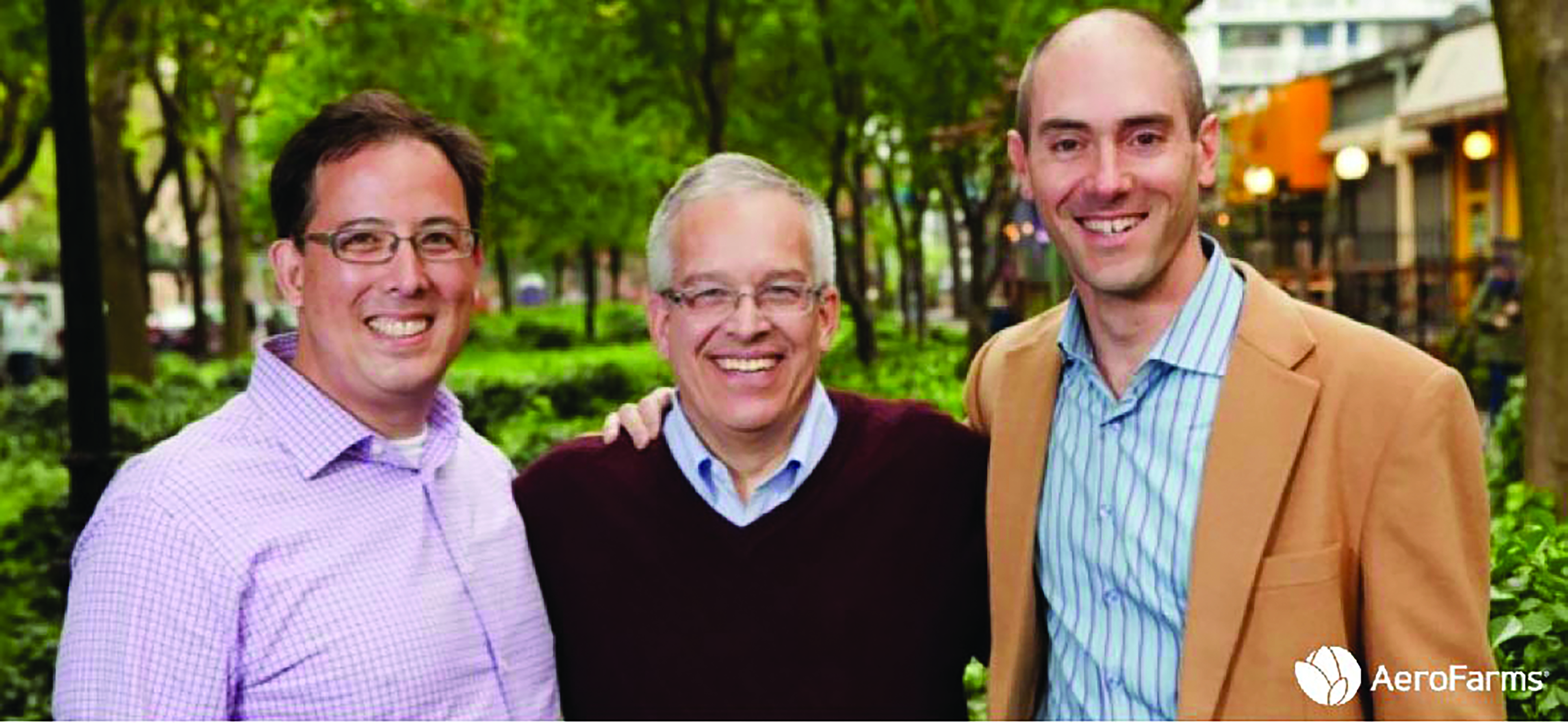

Mar 15, 2018AeroFarms pursues world’s highest-producing indoor farm operation
These are heady times to be working at Newark, New Jersey-based AeroFarms.
The “aero” in the name refers to aeroponics – the practice of misting plant roots with water and nutrients – rather than the towering stacks of plants in the company’s vertical farms. The company began in 2004 has expanded to multiple farms, the latest of which the company says is the largest in the world by production volume. Its global headquarters farm in Newark produces up to 20 million pounds of leafy greens per year in a 70,000-square-foot former steel mill — the world’s largest indoor vertical farm in terms of production, according to AeroFarms’ website. Another new farm, even larger than the last, is planned for a site in Camden, with a groundbreaking set to occur in 2018.
Last year held a number of accomplishments, including a partnership with Dell Technologies for computers used at the farms, tax incentives for the forthcoming Camden farm, and a million-dollar grant. The grant from the nonprofit Foundation for Food and Agriculture Research, along with a matching $1 million from AeroFarms, will go toward research to improve the quality of leafy greens grown in urban farms.
“This has been an exciting year, but it’s really a representation of many years of work,” said Mark Oshima, co-founder and chief marketing officer of AeroFarms.
With their stacks of plants supported by steel girders, indoor vertical farms can resemble a large industrial warehouse – but that rough exterior hides the growing that is actually taking place, aided by new technologies. Networked sensors and devices regulate the amount and types of water and nutrients and LED light that the plants receive. Vertical farming comes only as the result of pulling together a wide variety of disciplines and emerging technologies such as the LED lighting.
“We’ll be the first to tell you it’s not easy to do,” said Oshima, an MBA marketing professional with a background at companies such as Toys R Us, L’Oreal, and Turner Broadcasting.
From the start, the company has depended heavily on the experience and technical know-how of its employees. Oshima’s co-founders included serial entrepreneur David Rosenberg, now the company’s chief executive officer, and Ed Harwood, a former professor at Cornell University with a doctorate degree in dairy science from the University of Wisconsin-Madison. Harwood is the company’s chief science officer.
The reliance on expertise is the same today. Oshima said the company has plant pathologists, horticulturists, mechanical and electrical engineers, industrial engineers, biological engineers and microbiologists on staff. In summary, it’s “a lot of Ph.D.’s and expertise running around the organization thinking about farming in a very different light and a very different way,” he said.
“This holistic approach is so critical in understanding the relationship between the biology of the environment, our system – and then how we leverage data,” he said. “We can grow anything. There are no technology limitations.”
Although Oshima said they have grown vine crops and edible flowers with aeroponics, the farms focus mostly on short-stemmed leafy greens and herbs. Those crops are short enough that more layers can be stacked upon each other, increasing production.“ It’s not productivity per square foot, it’s productivity per cubic foot,” he said. “And so, we look for buildings. with higher ceilings that help us with that cubic foot equation.” The plants also can grow very quickly – greens that would take 35-45 days to grow in a field can be grown in 12-16 days in the vertical farms, he said.
“We’re doing some very unique mustard greens,” Oshima said. “You can deliver a terrific amount of heat.”
The farms have about 250 different varieties, and each has a unique profile or “growth recipe” for the nutrients, water and light, he said. They continue to tailor the recipes based on the data that’s collected from sensors all over the farms.
“We’re harvesting the data as much as we harvest the plant,” Oshima said.


Intellectual property
Using this scientific approach to growing, AeroFarms has made substantial advancements in its techniques and equipment – one example of this is the media in which the plant roots nestle. Many other growers use rock wool as a substrate or media for holding the roots in place and dispose of the material after growth for sanitary reasons. AeroFarms, though, has developed a proprietary replacement, a cloth made completely from recycled water bottles.
“It’s a cloth we developed – we have patents on this stuff,” Oshima said.
“We simply wash the cloth after every harvest, so we have a (bacteria/fungi) kill step there, and then reuse that.”
For a few years, starting in 2009, the company focused on the vertical farming equipment itself, as an original equipment manufacturer. But in 2011, the company pivoted back toward a focus on growing.
“We realized this intellectual property that we had developed was really too precious to be licensing,” Oshima said. “We wanted to maintain the integrity of it. We also wanted to manage our growth and where we’re going, decide where we’re going.”
The company has raised more than $100 million in equity and project financing, he said. The company’s goal is to start about 25 farms over the next five years.
“As a company, one of our biggest challenges is how we prioritize – how do we prioritize growth in a pragmatic way so we don’t overextend,” Oshima said.


Sharing information
Beyond the company’s expansion goals, it has another future commitment, one that could benefit the greater community of greens growers everywhere.
The $1 million grant from Foundation for Food and Agriculture Research (FFAR) and matching money from AeroFarms will examine whether or how environmental stressors – light, humidity, temperature – can be consistently used to improve crop traits like taste and nutritional quality.
When the grant was announced in the summer of 2017, United Fresh Produce Association President and CEO Tom Stenzel was among those toasting the effort.
“Pioneering initiatives like the work by AeroFarms and FFAR will help lead the produce industry with a science-backed approach to understand how to grow great tasting and nutritionally dense products consistently all year,” he said in a statement at the time. “We believe that there is a need for even more public/private partnerships like this to spur breakthroughs.”
AeroFarms scientists will collaborate with Rutgers University and Cornell University scientists on the project. The precision growing of controlled environment agriculture helps with measuring the stressors on the plants.
“There’s a lot you can do with controlled environment farming that you couldn’t do in the environment itself,” said Sally Rockey, executive director of the FFAR. But the data and knowledge gathered from controlled environment agriculture could have implications for growers everywhere, and she said the research will be made public both during the course of the study and when the research is completed.
“It could be important for both outdoor and indoor farming,” she said.
– Stephen Kloosterman, Assistant Editor
Above (top photo): AeroFarms currently operates several vertical farms in Newark, New Jersey, and plans to break ground in 2018 on what will be its largest farm, about 90 miles away in Camden. Photos: AeroFarms














